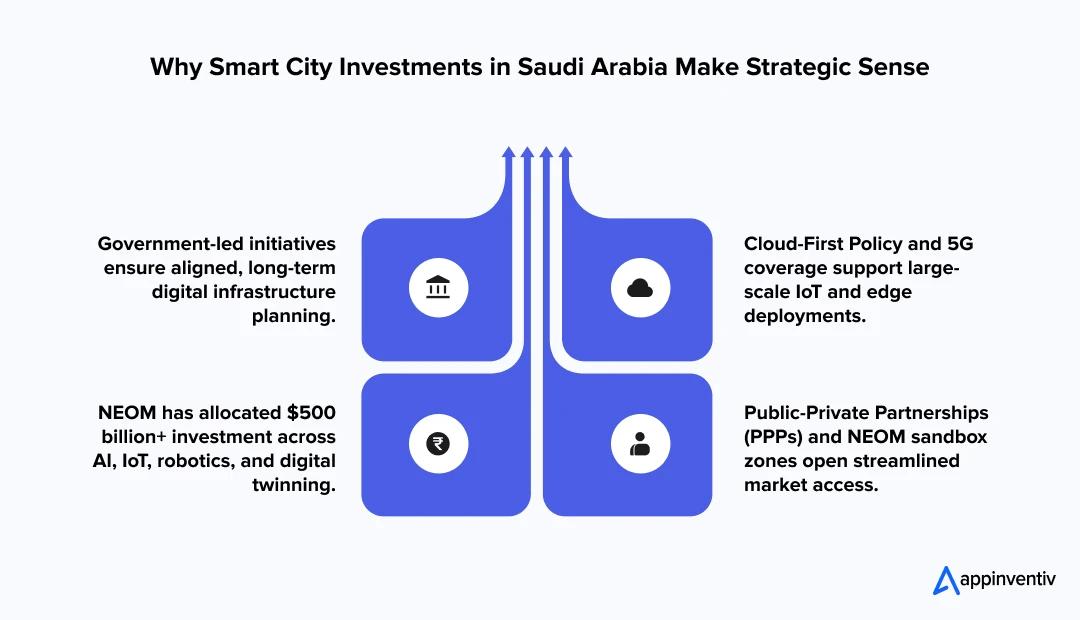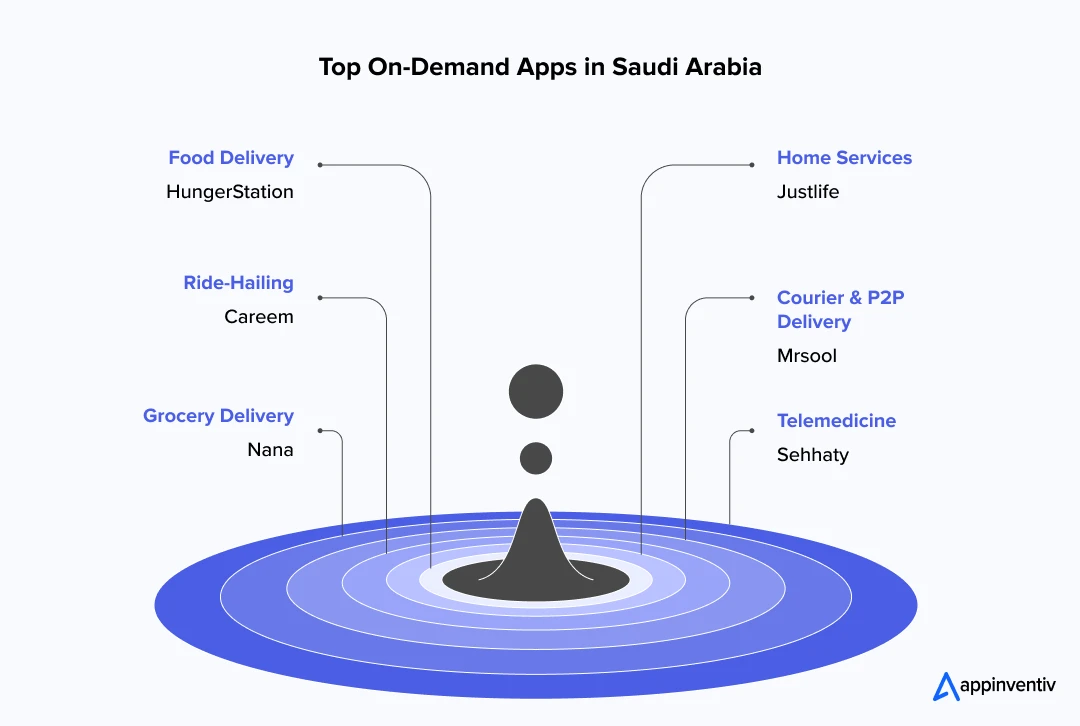- Saudi Arabia is rapidly evolving from an oil-dependent economy to a tech innovation hub, driven by Vision 2030, which has invested over $100 billion in AI and digital infrastructure, creating unprecedented opportunities for tech entrepreneurs.
- Prime business ideas include AI-powered solutions, cybersecurity services, FinTech platforms, smart city consulting, and health tech, all of which are aligned with government priorities and massive infrastructure investments.
- The government streamlines business setup, and major tech giants (AWS, Microsoft, Google) establish billion-dollar local data centers.
- Massive infrastructure investments are creating a supportive ecosystem and cultural shifts, opening previously untapped market segments.
When every mature market feels saturated, where do you place your next bet?
For forward-looking business leaders, this isn’t just a strategic consideration—it’s a critical one. And increasingly, the answer points to a region that’s not merely embracing digital transformation but actively shaping it at scale: Saudi Arabia.
Forget the outdated narrative of the Middle East as a passive, emerging market. Today, Saudi Arabia has positioned itself as a proving ground for enterprise innovation, backed by multi-billion-dollar infrastructure investments, government-funded tech accelerators, and digital policies designed to attract and scale high-impact businesses. The Kingdom isn’t just adapting to change—it’s engineering a digital-first economy with remarkable speed and precision.
The numbers reflect this momentum.

According to the Saudi Digital Government Authority, the Digital Experience Maturity Index achieved a rate of 85.04% at an “advanced” level. This highlights the increasing popularity of fields such as AI, cloud computing, fintech, and smart logistics. The Kingdom has already deployed 5G coverage to 77% of the population, while the cloud services market is expected to reach $13.97 billion by 2033, driven by partnerships with AWS, Oracle, and Google Cloud.
Meanwhile, 75% of transactions in Saudi Arabia are now digital, demonstrating the growing impact of fintech companies, and AI venture funding grew 61% YoY in the first half of 2025 alone.
These are not isolated achievements. They are indicators of a larger trajectory: Saudi Arabia is fast becoming the regional hub for next-generation enterprise technology.
For global tech leaders, here’s what makes this market particularly relevant:
- A digitally native population (71% under 35) means accelerated adoption and early scaling potential.
- Public-sector digitization means government contracts are open to tech partnerships.
- With Vision 2030 driving economic diversification, there is a clear demand for cloud platforms, AI solutions, automation tools, and scalable digital services across industries such as energy, logistics, healthcare, and tourism.
If you’re building, scaling, or investing in enterprise tech, 2025 isn’t the year to watch Saudi Arabia. It’s the year to enter.
In this blog, we explore the most high-potential, technology-driven business ideas in Saudi Arabia for 2025 and beyond. Mapped to Vision 2030, sector-specific shifts, and the Kingdom’s rapidly evolving digital economy, this guide is designed for enterprise leaders, entrepreneurs, and investors seeking to align with one of the world’s most ambitious and future-ready ecosystems.
Unlock Saudi Arabia’s tech boom with Appinventiv’s cutting-edge solutions.
Invest in AI, cloud, and fintech innovation to lead the digital revolution.
Understanding the Tech Landscape of Saudi Arabia to Invest Smartly in Profitable Business Ideas
Saudi Arabia, as the largest economy in the Middle East, is quickly evolving into a global technology hub. The country’s Vision 2030 initiative cannot be overstated in driving a massive shift towards a more diversified, tech-driven economy, which fosters growth in non-oil sectors such as technology, finance, tourism, and healthcare.
To invest wisely in Saudi Arabia’s booming tech ecosystem, enterprise leaders must first grasp the structural shifts driving it. The transformation is government-engineered, rooted in massive megaprojects, regulatory overhaul, and infrastructure modernization.
| Insight | Investment Implication |
|---|---|
| Tactical emphasis on foreign equity & ownership | Establishing wholly-owned subsidiaries or partnerships is now easier and more secure |
| Sandbox-ready fintech & GovTech atmospheres | Ideal for piloting cutting-edge solutions with less risk |
| Robust digital infrastructure | Platforms relying on cloud, data, AI, or IoT can now scale securely |
| Clear capital flow into SMEs & tech startups | Increasing opportunity for partnerships, acquisitions, or go-to-market support |
Key Business Ideas in Saudi Arabia: Driving Investment Opportunities in Evolving Industries
This growing tech ecosystem presents numerous profitable business opportunities for Saudi Arabia to capitalize on emerging technologies and trends in AI, Blockchain, cybersecurity, and more.
Blockchain-Based Solutions for Finance and Banking
Blockchain is a transformative technology that startups in Saudi Arabia can leverage to optimize costs, improve transparency, and secure financial transactions. The Saudi government is laying the groundwork for financial modernization, driven by Vision 2030 business ideas, and blockchain plays a key role in that transition.
The Middle East & Africa blockchain market is forecasted to reach $131,415.0 million by 2030, with a compound annual growth rate of 88.9% from 2023 to 2030. The country is actively promoting digital payments, with initiatives like SADAD (a national payment system) and the Saudi Arabian Monetary Authority (SAMA) backing blockchain technology for financial solutions.
Therefore, partnering with established blockchain app development service providers or building proprietary solutions can be the key to success.
Key Opportunities for Startups in Blockchain:
- Blockchain-based Payment Systems: Businesses can develop or integrate payment solutions powered by blockchain using platforms like Ripple or Stellar for cross-border payments.
- Smart Contracts for Regulatory Compliance: Using Hyperledger Fabric, businesses in banking can automate the enforcement of compliance and risk-management processes. For example, loan agreements can be executed automatically using smart contracts, which ensure terms are met without requiring manual intervention.
- Tokenization of Assets: Tokenizing assets like real estate or gold can provide a liquid market for otherwise illiquid assets. Businesses can create and trade tokenized versions of high-value items, enabling fractional ownership and expanding their investor base.
Saudi Arabia’s blockchain readiness isn’t just theoretical. SAMA joined the Aber Project—a blockchain-based cross-border payment experiment with the UAE Central Bank. Additionally, Saudi authorities are exploring national-level crypto asset regulation, suggesting long-term support for blockchain-led innovation.
By partnering with an experienced blockchain development company like Appinventiv, enterprises can unlock long-term value across financial services, supply chains, and governance.
AI-Driven Solutions for Healthcare Innovation
Saudi Arabia is strategically applying AI to modernize its healthcare system—targeting cost efficiency, clinical accuracy, and accessibility. Under Vision 2030, healthcare transformation is a national priority, and artificial intelligence is central to achieving it. The Ministry of Health and the National Center for AI are jointly investing in AI-driven platforms for early diagnostics, hospital workflow automation, and remote care delivery.
According to Grand View Research, Saudi Arabia’s AI healthcare market is projected to reach $191.3 million by 2030, growing rapidly due to a combination of public-sector digital mandates and private-sector investment. This presents a timely opportunity for technology firms to build domain-specific AI tools tailored to regulated healthcare environments.
Key Investment Areas in AI Healthcare:
- Predictive Diagnostics
Deep learning algorithms are outperforming traditional diagnostic methods in detecting diseases like cancer, diabetes, and cardiovascular conditions. Enterprise platforms modeled after systems like Google DeepMind can be localized to analyze imaging data, blood work, and wearable device inputs—offering decision support for clinicians and reducing time-to-diagnosis in critical cases. - AI-Driven Telemedicine and Remote Monitoring
With rising demand for healthcare access in underserved regions, AI-enhanced platforms are enabling virtual consultations, real-time symptom analysis, and post-discharge monitoring. In Saudi Arabia, where rural coverage is a national concern, such platforms offer strong growth potential. - Personalized Medicine Platforms
AI models that integrate genomic data, medical history, and lifestyle inputs are powering personalized treatment pathways—enabling better therapeutic outcomes while reducing trial-and-error in medication and care plans. These platforms are being piloted globally and can be adapted for Saudi’s high-prevalence conditions like obesity and diabetes.
The Saudi Data and Artificial Intelligence Authority (SDAIA) is already working on national AI strategies in healthcare, and hospitals are investing in clinical decision support systems (CDSS). With a government-backed push for cloud-native infrastructure and integrated EHRs, the environment is primed for enterprise AI deployment.
For Healthtech organizations, now is the window to explore AI healthcare business ideas in Saudi Arabia, forge public-private partnerships, and contribute to the Kingdom’s goal of delivering world-class digital care.
Smart Cities and IoT Innovations

Saudi Arabia is not just investing in smart cities—it’s building purpose-designed digital ecosystems from the ground up. As part of Vision 2030, giga-projects like NEOM, Qiddiya, and the Red Sea Project are being developed with embedded technologies at their core, from edge computing to IoT-enabled city services. This opens up large-scale, government-supported opportunities for tech providers delivering IoT, 5G, AI, and cloud-native platforms.
Globally, the smart cities market is projected to surpass $1445.6 billion by 2030, and Saudi Arabia is positioned to be one of its largest contributors in the MENA region. These developments are not just futuristic—they are active procurement opportunities for solution providers in mobility, utilities, energy, and public services.
Key Business Opportunities in Saudi Smart Cities:
- Intelligent Traffic Management Systems
Leverage real-time data from road-embedded sensors, vehicle telematics, and connected cameras to design adaptive traffic systems. These systems reduce congestion, optimize emergency vehicle access, and enable predictive traffic routing—already piloted in early NEOM infrastructure layers.
- IoT-Integrated Smart Buildings
Offer commercial-grade building automation systems that use real-time data for energy management, air quality control, occupancy detection, and asset tracking. With mega-developments targeting LEED certifications and green design mandates, these solutions are in high demand.
Also Read: The Role of IoT in Building Smart Cities
- Smart Waste & Utilities Management
Deploy sensor-based monitoring tools that notify municipal teams of collection needs, water leakage, or system inefficiencies. Such systems improve service delivery, reduce costs, and align with sustainability KPIs set by Vision 2030.
Businesses exploring startup opportunities in smart city infrastructure should prioritize investments in IoT, AI, and 5G technologies. Collaboration with government-backed projects like NEOM will ensure seamless integration and long-term sustainability of future-ready businesses in the Middle East.
EdTech: Revolutionizing Education in Saudi Arabia
Saudi Arabia is rapidly reimagining its education ecosystem, shifting from traditional classrooms to digitally enriched, scalable learning environments. In alignment with Vision 2030’s goal to build a knowledge-based economy, the government is investing heavily in EdTech platforms that improve accessibility, learning outcomes, and workforce readiness.
The EdTech market size in Saudi Arabia is expected to reach $6,847.8 million by 2033, projecting a growth rate (CAGR) of 12.77% during the forecast period of 2025-2033. This growth is driven by increased demand for AI-based learning tools, immersive content, and mobile-first education solutions, especially across K-12, higher education, and professional training.
Key Investment Opportunities in EdTech:
- AI-Powered Personalized Learning
Intelligent learning platforms that adapt content in real-time based on student performance data, enabling tailored learning journeys across age groups and learning styles.
- Cloud-Based Remote Education
Scalable platforms for virtual classrooms, asynchronous coursework, and teacher collaboration address the need for equitable access across regions and social segments.
- Immersive AR/VR Learning Environments
Create simulation-based educational content—such as historical re-creations, STEM experiments, or medical training—using AR/VR technology for deeper engagement and retention.
Market Momentum
With a young, mobile-first population, increasing government investment, and a growing demand for on-demand learning, EdTech in Saudi Arabia is no longer a future opportunity—it’s a current one.
For enterprises building LMS platforms, AI tutoring engines, or immersive content libraries, the environment is primed for scaling, localization, and institutional partnerships.
- The Ministry of Education has partnered with global players to digitize curricula and build national eLearning platforms.
- Platforms like Udemy, Coursera, and Noon Academy have already entered the Saudi market, validating both demand and openness to foreign solutions.
- Generative AI is now enabling adaptive learning paths, automated content generation, and teacher productivity tools—opening the door for SaaS-based education solutions tailored to Arabic-language and regional needs.
Suggesting to read: How AI in Education is Transforming the Industry
Electric Vehicles (EVs) and Charging Infrastructure
As Saudi Arabia transitions toward a low-carbon economy, electric mobility is emerging as a strategic pillar of both its climate goals and smart infrastructure development. Under Vision 2030, the Kingdom has committed to reducing its carbon footprint, diversifying energy sources, and transforming transportation, creating substantial opportunities in the EV and e-mobility ecosystem.
According to Mordor Intelligence, the EV market in Saudi Arabia is projected to grow at a CAGR of 24.55%, reaching $1.86 million by 2030. Government-backed initiatives, coupled with rising fuel prices and regulatory pressure to cut emissions, are accelerating demand across both public and private sectors.
Key Opportunities in EV and eMobility:
- EV Fleets for Corporate & Government Use
The Kingdom is actively electrifying public transport, logistics, and municipal fleets—creating demand for bulk procurement, fleet management software, and EV-as-a-service models. - EV Charging Infrastructure
A national rollout of fast-charging stations is underway along highways, malls, commercial zones, and industrial parks. Enterprises can partner with urban planners, real estate developers, or government bodies to deploy, operate, or maintain charging grids. - Autonomous & Connected EV Systems
NEOM’s transportation blueprint includes autonomous electric shuttles and AI-based mobility networks. Businesses offering sensor tech, fleet intelligence platforms, or vehicle-to-grid (V2G) software can plug into these high-investment projects.
AI-Powered Supply Chain and Logistics
As Saudi Arabia works to position itself as a global logistics hub, artificial intelligence is becoming essential to modernizing supply chains. The integration of AI in logistics is improving accuracy, reducing manual dependencies, and making operations more cost-efficient and scalable.
Key Areas for Investment
- Predictive Maintenance: AI-powered systems can predict when machinery or vehicles will require maintenance, allowing companies to avoid unplanned downtime and improve supply chain reliability.
- Automated Warehouses: Companies like Amazon have already implemented robotic systems in their warehouses, reducing the need for human labor and improving warehouse throughput.
- Real-Time Tracking: AI and IoT sensors can track products and materials in real-time, providing businesses with instant updates on their supply chain, improving efficiency, and reducing waste.
As part of the Kingdom’s National Industrial Development and Logistics Program (NIDLP), the adoption of AI in logistics is not only encouraged—it’s also prioritized. Enterprises that build or deploy intelligent logistics solutions in Saudi Arabia will be well-positioned to serve both regional and global supply networks.
Witness a 60% supply chain glow-up!
Peek into our case studies to see how our AI & Analytics wizardry supercharged a global manufacturing titan.
AI-Enhanced eCommerce Platforms
The eCommerce market in Saudi Arabia is expected to generate a volume of $24.13 billion by 2029, creating significant momentum for AI-led innovation in both B2C and B2B retail environments. Backed by increasing internet penetration, mobile-first consumer behavior, and rising expectations for digital convenience, the market is no longer just expanding—it’s maturing fast.
Government initiatives continue to create a business-friendly environment for digital retail, while AI is emerging as the core engine, driving everything from real-time personalization and customer engagement to predictive logistics and inventory optimization.
Key Investment Opportunities in AI-Powered eCommerce:
- Personalized Product Recommendations
Deploy AI engines that analyze customer behavior, purchase history, and browsing patterns to deliver highly personalized product suggestions. These systems drive conversion rates, increase average order value, and build long-term user engagement. - Conversational AI for Customer Support
AI chatbots and virtual agents can handle inquiries, resolve issues, and manage orders, reducing operational costs and enhancing response times. These systems are increasingly integrated with WhatsApp, voice assistants, and mobile apps to serve a mobile-first audience. - Predictive Inventory Management
Use AI-based demand forecasting to optimize stock levels, minimize waste, and prevent out-of-stock or overstock scenarios. These tools enable just-in-time inventory strategies, essential for fast-moving product categories.
These innovations reflect broader new business trends in Saudi Arabia for 2025, where AI-driven platforms are no longer a competitive edge—they’re becoming the standard for scaling digital retail.
Rising Popularity of On-Demand Services in KSA

There was a time when on-demand meant food delivery and ride-hailing. That time is long gone.
In Saudi Arabia, the on-demand economy is evolving into something far more expansive—a digital infrastructure for modern living. Home maintenance, beauty services, fitness coaching, even pet care—if it can be booked, tracked, and rated, there’s an app for it, or soon will be.
And the demand isn’t slowing down. The on-demand services market is expected to hit $917.37 million by 2033. Why? Because urban lifestyles are shifting, and mobile-first behaviors are no longer optional—they’re default.
Where the Real Opportunities Are
- Beauty & Wellness Apps
Create scalable applications that support service discovery, booking, and AI-driven personalization for beauty salons, dermatology clinics, and at-home wellness providers. Integration with payment gateways, ratings, and CRM systems enables full lifecycle management. - Fitness on Demand
Build platforms that connect certified trainers and instructors with users for home-based or hybrid training sessions. AI integration enables dynamic workout suggestions and health tracking, opening avenues for startup ideas in KSA. - Home Repairs & Maintenance
Offer white-label solutions or APIs for service aggregators handling electrical, plumbing, appliance repair, and facility maintenance, equipped with automated dispatching, technician tracking, invoice generation, and inventory sync.
Saudi Arabia’s on-demand economy presents a clear opening to build foundational infrastructure for a rapidly maturing service landscape. Government-backed urban projects like NEOM, Qiddiya, and Red Sea Global will require localized, tech-enabled service models, making early positioning critical.
Gaming and eSports
Saudi Arabia is not just participating in the global gaming boom—it’s actively shaping it. With a youthful population, increasing disposable income, and government-led investments through entities like Savvy Games Group (backed by the Public Investment Fund), the Kingdom is rapidly emerging as a gaming and eSports hub in the MENA region.
The National Gaming and eSports Strategy aims to make Saudi Arabia a global gaming center by 2030, opening the door for scalable business models in development, infrastructure, and interactive entertainment.
Key Areas for Strategic Investment
Saudi Arabia is hosting globally recognized events such as the Gamers8 festival and Saudi eLeagues, drawing international audiences and players. Enterprises Startups can build platforms to support tournament organization, talent discovery, and real-time audience engagement.
As the infrastructure for cloud computing and 5G expands, there is a rising demand for low-latency, device-agnostic gaming experiences. This opens up startup opportunities in Saudi Arabia to develop region-optimized cloud gaming platforms or partner with existing services for local deployment.
With a growing appetite for immersive content, AR/VR gaming—whether through headsets or location-based experiences like VR arcades—is gaining momentum. Businesses can invest in developing interactive titles, simulation-based training games, or XR infrastructure tailored to Saudi consumer habits.
For tech entrepreneurs, infrastructure providers, and gaming studios, the opportunity lies in mobile game app development that will support the Kingdom’s ambitions to lead the gaming economy in the region.
Cloud Computing and Data Analytics Solutions
The public cloud market revenue in Saudi Arabia is expected to reach $9.94 billion by 2030, driven by the rise of big data analytics and the increasing need for secure data storage.
Cloud computing is no longer just a technology layer—it’s the foundation for Saudi Arabia’s digital economy. As the Kingdom advances its Vision 2030 goals, cloud adoption is accelerating across emerging industries in Saudi Arabia, powering everything from real-time collaboration to advanced data analytics and secure digital operations.
Key Areas for Strategic Investment
- Enterprise Cloud Migration
Saudi enterprises are re-architecting legacy systems to support faster deployments, modular builds, and multi-cloud environments. Migration is no longer a phase—it’s foundational. - Advanced Analytics & AI
The shift is from reporting to intelligence. Businesses are adopting analytics platforms that surface operational insights in real time and integrate directly into decision flows. - Cloud Security & Compliance
Security expectations have moved upstream. Enterprises now require embedded compliance, data sovereignty, and zero-trust frameworks from the first deployment.
AI-Powered Smart Farming Platforms in Saudi Arabia
The smart farming market in Saudi Arabia is expected to reach $304.3 million by 2033, driven by the government’s focus on sustainable agricultural practices, aiming for more secure and resource-efficient farming methods.
AI in agriculture is transforming this industry in Saudi Arabia by optimizing farming practices, improving crop yields, and conserving resources. AI-powered smart farming in Saudi Arabia leverages machine learning, IoT sensors, and drones to optimize farming practices, improve crop yields, and conserve resources.
Technologies like predictive analytics for crop health, precision irrigation, and automated harvesting help farmers make data-driven decisions, increase efficiency, and reduce costs, particularly in the face of water scarcity.
Key Investment Areas in AI Smart Farming:
- Predictive Analytics for Crop Health: Using AI-driven systems, integrated with drones and IoT sensors, farmers can monitor crop health, predict pest outbreaks, and detect early signs of diseases.
- Automated Irrigation and Water Management: AI-based systems can analyze weather patterns and soil moisture levels to optimize irrigation schedules, ensuring crops receive the right amount of water while reducing waste. This is crucial for Saudi Arabia, where water conservation is a top priority.
- Farm Management Software: AI-powered platforms help farmers manage crop rotation, resource allocation, and production timelines more efficiently by integrating data from sensors, weather stations, and satellite imagery.
OTT Streaming Platform Focused on Regional Content in Saudi Arabia
The OTT streaming market in Saudi Arabia is rapidly expanding with a CAGR of 6.17% (from 2025 to 2030), reaching a market volume of $673.87 million by 2030. The country’s push to become a major entertainment hub is fueling new business trends in 2025 for Saudi Arabia, particularly with a focus on region-specific content that resonates with local audiences.
Key Investment Areas in OTT Streaming Platform:
- Live-Streaming of Events: Saudi Arabia’s interest in hosting live sports, music festivals, and cultural events presents an opportunity for streaming platforms to start a business in Saudi Arabia in 2025.
- AI-Powered Content Recommendations: OTT platforms can leverage AI technologies to analyze viewing habits and personalize content recommendations for users. This increases viewer engagement by offering suggestions based on past preferences and genres that align with their interests.
To build an OTT streaming platform, businesses should focus on integrating AI-based recommendation systems to deliver a more personalized user experience. A flexible subscription model can also help cater to different customer preferences.
Pitch your big idea to Appinventiv’s app wizards!
Witness how we weave tech magic to turn your vision into reality in Saudi Arabia’s digital frontier.
Common Mistakes to Avoid When Entering the Saudi Arabian Market
Saudi Arabia offers a high potential for positive outcomes—but only to businesses that approach it with precision. Here are the most frequent missteps enterprises make when entering the Kingdom’s fast-evolving tech and business environment:
Overlooking Regulatory Complexity
Sectors like healthcare, finance, and telecom operate under strict regulatory oversight. It is recommended that you not overlook local data residency laws or sector-specific licensing requirements.
What to do: Regulatory missteps are harder to fix than to prevent. Therefore, partner with a company that is well-acquainted with compliance as per the region and industry.
Treating Localization as an Afterthought
Saudi users expect culturally aligned UX, content, and service design. A generic product, even if technically strong, might not gain traction.
What to do: Localize interfaces, onboarding flows, and communications for relevance, not just translation.
Underinvesting in Relationship Capital
Market access in Saudi Arabia often moves through trust, not just contracts. Businesses that skip local presence or partnerships struggle to scale.
What to do: Prioritize in-market teams, participate in sector events, and build long-term partnerships.
Lagging Behind Digital Expectations
The Kingdom is digitally native—especially among younger consumers and public sector platforms. Businesses without mobile-first, AI-powered capabilities risk obsolescence.
What to do: Lead with cloud, mobile, and AI-driven offerings.
Misreading Consumer Behavior
Convenience, personalization, and status still drive consumer decisions. Enterprises that fail to align their product strategy with these expectations tend to underperform.
What to do: Invest in targeted market research and adapt feature sets accordingly.
How Appinventiv is Your Ideal Tech Partner to Launch Your Business Ideas in Saudi Arabia?
In a market defined by speed, regulation, and digital-first growth, execution matters more than ambition. Saudi Arabia doesn’t just reward new ideas—it rewards those who deliver them right the first time. Therefore, we at Appinventiv provide mobile app development services in Saudi Arabia that help enterprises and startups turn Vision 2030-aligned business ideas into digital products built for scale, speed, and your target user preferences.
With a decade of product development experience, we’ve helped startups and global brands, including JobGet, IKEA, Domino’s, Adidas, and KPMG, bring their ideas to life with technology that’s user-centric and market-ready.
Take our work with KFC, for example.
We built a next-gen, AI-powered food delivery ecosystem tailored to their regional operations—seamlessly integrating order management, location tracking, payment gateways, and customer engagement in a single mobile experience.
The result?
- Over 2 million app downloads
- 4.5+ user rating
- 22% increase in conversion rate
- 60% increase in repeat purchases across channels
This is the kind of strategic, results-driven execution that Appinventiv brings to every engagement, from AI-based automation to cloud-native scalability and regulatory compliance.
- MENA-Specific Digital Product Expertise
From Riyadh to NEOM, our platforms are optimized for local infrastructure, supporting Arabic and English user experiences, local payment systems such as Mada and STC Pay, and Saudi regulatory frameworks across finance, healthcare, and retail.
- AI, Blockchain, and Smart City Readiness
Whether it’s an AI-powered logistics engine, a blockchain-based payment solution, or IoT applications for NEOM’s smart grid, our team delivers purpose-built software aligned with national digital priorities.
We work towards one shared standard: excellence. From cloud architects and AI engineers to compliance strategists and UX innovators, our team builds solutions that move markets, not just meet requirements.
- Enterprise-Grade Security & Compliance
Our solutions are built to meet the Kingdom’s evolving data privacy laws and sector-specific regulations. We implement end-to-end encryption, secure cloud environments, and role-based access controls, ensuring your platform is audit-ready, license-compliant, and trusted by both users and regulators.
Whether you’re launching a new venture in Saudi Arabia or scaling an existing one, we deliver enterprise-grade solutions to thrive in the KSA’s dynamic tech landscape. Contact us to leverage our expertise, regulatory alignment, and speed to execute what today’s enterprises demand.
FAQs
Q. Which industries are growing fast in Saudi Arabia right now?
A. Saudi Arabia’s digital economy is expanding across several strategic sectors, each aligned with Vision 2030’s transformation goals. The most promising industries for tech-driven businesses include:
- Artificial Intelligence (AI): AI is central to the Kingdom’s digital strategy, with national-level investments such as Project Transcendence, backed by over $100 billion, to accelerate AI adoption across healthcare, education, logistics, and public services.
- FinTech: With over 70% of retail cashless transactions, Saudi Arabia is accelerating toward becoming a cashless economy by 2030. The Saudi Central Bank’s sandbox and proactive FinTech licensing have created fertile ground for payment apps, BNPL, and e-wallets.
- Cloud Computing: Global cloud leaders are establishing a strong presence—AWS announced a $5.3 billion investment to expand cloud infrastructure. This surge is enabling enterprise modernization and the digitization of the public sector.
- IoT & Smart Cities: Smart city initiatives like NEOM, the Red Sea Project, and Qiddiya are projected to drive Saudi Arabia’s smart tech market to $2.9 billion by 2025. These projects demand integrated IoT, AI, and digital twin platforms.
- eCommerce & Digital Retail: The eCommerce market revenue is expected to reach a market volume of $24.13 billion by 2029, showing a CAGR of 9.91% from 2025 to 2029. This growth highlights the expanding digital retail landscape in Saudi Arabia, offering abundant opportunities for businesses to tap into the thriving eCommerce sector.
Q. Which sectors will see the most growth in Saudi Arabia by 2030?
A. Saudi Arabia will see explosive growth through the $100 billion initiative, establishing itself as a major player in artificial intelligence, data analytics, and advanced technology. Let’s see some of the sectors that can leverage this growth:
- Data Centers & Cloud Infrastructure will expand massively, with Amazon, Microsoft, and Google establishing major facilities.
- FinTech & Digital Payments will transform the financial landscape with Vision 2030’s cashless society goals and blockchain integration.
- Smart City Technologies, including IoT, sensors, and urban management systems, will power mega-projects like NEOM and the Red Sea.
- AgriTech & Climate Tech are emerging as key investment areas with substantial VC funding. Health Tech will surge with AI-powered diagnostics and telemedicine platforms supporting healthcare privatization goals.
Q. What are the most profitable business ideas in Saudi Arabia in 2025?
A. As technology is growing at a fast pace in Saudi Arabia, you can implement these profitable business ideas:
- AI-Powered Arabic Language Solutions: Develop chatbots, translation services, and content generation tools specifically for Arabic-speaking markets, following successful models like Lisan.ai.
- Smart City Consulting: Develop IoT integration services for urban planning, traffic management, and energy optimization in mega-projects and existing cities.
- AgriTech Startups: Launch vertical farming technologies, smart irrigation systems, and food security solutions addressing the Kingdom’s agricultural challenges.
- Health Tech Platforms: Develop telemedicine applications, AI diagnostic tools, and healthcare management systems for the privatized medical sector.
- eCommerce Enablement Services: Build logistics, payment processing, and marketplace solutions supporting the booming online retail sector.





















